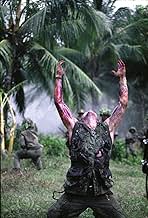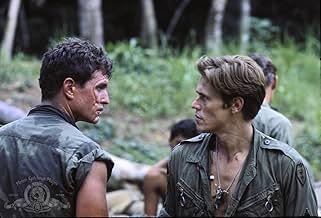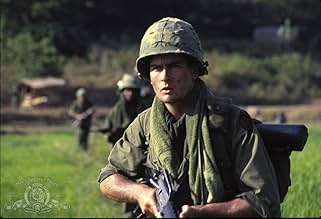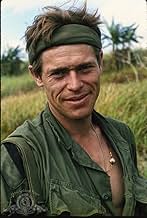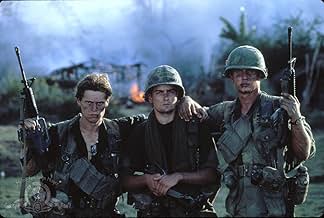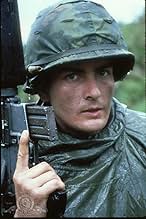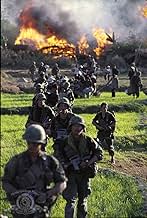Un jeune soldat au Vietnam traverse une crise morale lorsqu'il est confronté aux horreurs de la guerre et à la dualité de l'homme.Un jeune soldat au Vietnam traverse une crise morale lorsqu'il est confronté aux horreurs de la guerre et à la dualité de l'homme.Un jeune soldat au Vietnam traverse une crise morale lorsqu'il est confronté aux horreurs de la guerre et à la dualité de l'homme.
- Récompensé par 4 Oscars
- 24 victoires et 16 nominations au total
Résumé
Reviewers say 'Platoon' is acclaimed for its realistic Vietnam War portrayal, highlighting soldiers' moral and psychological struggles. Oliver Stone's veteran experience enhances authenticity. The film is lauded for its gritty style and strong performances by Willem Dafoe and Tom Berenger. However, some critics argue it oversimplifies moral issues and lacks historical accuracy. Its anti-war message is both praised and criticized for being simplistic and propagandistic. Despite mixed views on artistic merit, 'Platoon' is recognized for its emotional impact and resonance.
Avis à la une
Ever since Steven Spielberg wowed the cinematic world and changed the aesthetic of the war movie forever with the exceptional opening 25 minutes of 1998's Saving Private Ryan - the film went downhill from there - audiences have come to expect the same grainy camera-work and ultra-realism of Spielberg's breathtaking vision whenever a battle is depicted. Anything else would be 'unrealistic', and many movies dated horribly almost overnight as a result. While Oliver Stone's Platoon, which was once considered difficult to watch due to its unflinching depiction of the insanity of war, may not seem quite as brutal as it used to, it possesses one thing that no war other movie can boast - the guiding hand of a veteran.
Stone did a tour in Vietnam which ended in 1968, changing the future writer/director forever. Starting out life as a screenplay focusing on a soldier's experiences both before and during the war which had Jim Morrison touted for the lead, it evolved into a movie focused solely on a young volunteer's time spent in the sweaty, eternally damp jungle. Charlie Sheen's Chris Taylor is an obvious stand-in for Stone, and he arrives fresh-faced and eager to fight for his country. By the end, he is dazed and confused, and angry at the country who would send such "bottom of the barrel" men - invisible in society - into a world of such horror and meaningless bloodshed. It's an experience that moulded Stone into the one of the most outspoken voices in cinema.
The casting of the two sergeants vying for Chris' soul is a stroke of genius. The platoon is made up of two main groups - the 'juicers', a collection of beer-swilling meat-heads seemingly intent on violence at every opportunity, and the 'heads', a more laid-back and weary bunch who are happiest when getting high and having a singalong. At the head of the juicers is Sgt. Barnes, played by Tom Berenger, an actor known for his heart-throb leading-man roles but here cast as a dead-eyed, heavily scarred brute. While Willem Dafoe, who was and still is known for his crazy-eyed villainous roles, plays the wiser, gentler leader of the heads, an all-round good guy battling his own demons. By toying with expectations, Stone adds layers to their characters, and they both received Best Actor nominations for their efforts.
Yet what makes Platoon truly stand out 30 years after its release is the way Stone manages to transport the audience to that terrible place. It's teeming with dangers at every turn, be it the ants, the snakes or the Viet Cong better equipped for the harsh surroundings, the most frightening moment is when they fall asleep. And even when they awake, there's something moving in the shadows. The film never allows you to ever be at ease, despite the fun to be had with spotting the many famous faces dotted throughout the supporting cast. There are flaws, especially with some overacting from some of the supporting cast - in particular John C. McGinley - and Chris' unnecessary, rambling narration, but the movie packs such a punch that it's easy to forget these quibbles. It's a true insight into the mind of a grunt and how combat can have a lasting, eye-opening effect on those on the ground, and undoubtedly one of the most important war pictures ever to come out of the US.
Stone did a tour in Vietnam which ended in 1968, changing the future writer/director forever. Starting out life as a screenplay focusing on a soldier's experiences both before and during the war which had Jim Morrison touted for the lead, it evolved into a movie focused solely on a young volunteer's time spent in the sweaty, eternally damp jungle. Charlie Sheen's Chris Taylor is an obvious stand-in for Stone, and he arrives fresh-faced and eager to fight for his country. By the end, he is dazed and confused, and angry at the country who would send such "bottom of the barrel" men - invisible in society - into a world of such horror and meaningless bloodshed. It's an experience that moulded Stone into the one of the most outspoken voices in cinema.
The casting of the two sergeants vying for Chris' soul is a stroke of genius. The platoon is made up of two main groups - the 'juicers', a collection of beer-swilling meat-heads seemingly intent on violence at every opportunity, and the 'heads', a more laid-back and weary bunch who are happiest when getting high and having a singalong. At the head of the juicers is Sgt. Barnes, played by Tom Berenger, an actor known for his heart-throb leading-man roles but here cast as a dead-eyed, heavily scarred brute. While Willem Dafoe, who was and still is known for his crazy-eyed villainous roles, plays the wiser, gentler leader of the heads, an all-round good guy battling his own demons. By toying with expectations, Stone adds layers to their characters, and they both received Best Actor nominations for their efforts.
Yet what makes Platoon truly stand out 30 years after its release is the way Stone manages to transport the audience to that terrible place. It's teeming with dangers at every turn, be it the ants, the snakes or the Viet Cong better equipped for the harsh surroundings, the most frightening moment is when they fall asleep. And even when they awake, there's something moving in the shadows. The film never allows you to ever be at ease, despite the fun to be had with spotting the many famous faces dotted throughout the supporting cast. There are flaws, especially with some overacting from some of the supporting cast - in particular John C. McGinley - and Chris' unnecessary, rambling narration, but the movie packs such a punch that it's easy to forget these quibbles. It's a true insight into the mind of a grunt and how combat can have a lasting, eye-opening effect on those on the ground, and undoubtedly one of the most important war pictures ever to come out of the US.
At the height of the Vietnam War, America's teens are drafted into the war effort to find themselves in the middle of hell. One such young man is Chris Taylor. He is placed in a squadron where two sergeants have different approaches to the war Elias is more about surviving without being brutal or cruel, whereas Barnes is crueller, more ruthless and more violent. During the course of his term, Taylor's very soul is torn between the two men as he deals with what he must do.
The first film in Oliver Stone's unofficial trilogy is arguably the best of the three. The basic story not only shows us what the war was like for those serving but also how the different personalities come out of those involved in it. As we follow Taylor we see him change as he is influenced by those around him and by his situation. It makes for an uncomfortable film but one that's worth watching. It's certainly a better war movie than things like Wild Geese or The Dirty Dozen, simply because it's a little more real to what happens than those ones.
Charlie Sheen has never been better than when he's acting for Stone. Here he gives one of his best ever performances as the innocent who is changed. Willem Dafoe is a great actor and here is no different he also gives us one of the film's most enduring images so I'm a little biased. Berenger is another one for whom it's hard to think of a higher point reached than when he did this film. He is brutal and ruthless but he makes us support him in a strange way. The support cast are all good and contains a few famous faces (John C McGinley, Whitaker, Depp) however this is really a three man show.
Overall this is brutal and violent with no happy ending. At the end of the day isn't that what a war film should be?
The first film in Oliver Stone's unofficial trilogy is arguably the best of the three. The basic story not only shows us what the war was like for those serving but also how the different personalities come out of those involved in it. As we follow Taylor we see him change as he is influenced by those around him and by his situation. It makes for an uncomfortable film but one that's worth watching. It's certainly a better war movie than things like Wild Geese or The Dirty Dozen, simply because it's a little more real to what happens than those ones.
Charlie Sheen has never been better than when he's acting for Stone. Here he gives one of his best ever performances as the innocent who is changed. Willem Dafoe is a great actor and here is no different he also gives us one of the film's most enduring images so I'm a little biased. Berenger is another one for whom it's hard to think of a higher point reached than when he did this film. He is brutal and ruthless but he makes us support him in a strange way. The support cast are all good and contains a few famous faces (John C McGinley, Whitaker, Depp) however this is really a three man show.
Overall this is brutal and violent with no happy ending. At the end of the day isn't that what a war film should be?
Many great war films of the Vietnam conflict are centered around these themes of blurred morality and the uselessness of war, and Oliver Stone's Platoon is among the most well known. Stone, who wrote and directed the film and also served as an infantryman in Vietnam, first rose to fame for his war films that dramatized the infamous Cold War conflict. The main premise of his magnum opus are the inner conflicts within US forces deployed to southeast Asia, rather than the actual physical conflicts between them and the Communist-allied Vietnamese forces. More broadly, Platoon analyzes the "duality of man" concept that has been studied in numerous other works, from fellow Vietnam War films like Full Metal Jacket (1987) and Apocalypse Now (1979), all the way back to the latter's source material and inspiration in Joseph Conrad's Heart of Darkness.
Platoon focuses on the moral decay of soldiers in American units, and how this contributes to their inability to fight their Vietnamese enemies. Charlie Sheen sums up this theme with his on-the-nose voiceover, "We did not fight the enemy, we fought ourselves... and the enemy was in us."
Vietnam War-movies tend to be even harder to watch than most war flicks, as the lines between the "heroes" and "villains" are blurred more than in any other dramatized period of warfare in recent human history. In wars like World War II, which are widely known for being as black and white as military conflicts have become, the contrasting features between the heroic forces we are meant to root for and their opposing enemy platoons are well defined. That is almost never the case with the United States-North Vietnamese/Vietcong conflict in Vietnam during the overarching Cold War.
That is not to say that most wars throughout human history have not been many shades of grey, with the winners and losers not always corresponding with the righteous and evil. But because of the guerrilla nature and infamous legacy of the Vietnam War itself - namely, the immense public protest against American involvement - the Vietnam War remains by far the most unpopular war in modern American history. With that said, most of the film is fantastic, from the aforementioned narrative to the grim lightning of the southeast Asian jungles that emphasize the film's tone, to the poignant, melancholic score.
Platoon focuses on the moral decay of soldiers in American units, and how this contributes to their inability to fight their Vietnamese enemies. Charlie Sheen sums up this theme with his on-the-nose voiceover, "We did not fight the enemy, we fought ourselves... and the enemy was in us."
Vietnam War-movies tend to be even harder to watch than most war flicks, as the lines between the "heroes" and "villains" are blurred more than in any other dramatized period of warfare in recent human history. In wars like World War II, which are widely known for being as black and white as military conflicts have become, the contrasting features between the heroic forces we are meant to root for and their opposing enemy platoons are well defined. That is almost never the case with the United States-North Vietnamese/Vietcong conflict in Vietnam during the overarching Cold War.
That is not to say that most wars throughout human history have not been many shades of grey, with the winners and losers not always corresponding with the righteous and evil. But because of the guerrilla nature and infamous legacy of the Vietnam War itself - namely, the immense public protest against American involvement - the Vietnam War remains by far the most unpopular war in modern American history. With that said, most of the film is fantastic, from the aforementioned narrative to the grim lightning of the southeast Asian jungles that emphasize the film's tone, to the poignant, melancholic score.
Platoon is generally regarded as one of the strongest anti-war films of all time. While this is certainly true, what's often overlooked -- at least after only one run through the film -- is that it's chiefly a tale of God vs. Satan, and the war is there to set a perilous backdrop. No doubt, Platoon shows the Vietnam War was a big mistake, but being a fictional documentary on Vietnam is far from its purpose.
The story is told from the point of view of Chris Taylor (solidly played by Charlie Sheen), a middle class kid who goes to Vietnam to do what he thinks is his patriotic duty. In the first ten minutes, Chris is shown in the uncomfortable jungle, struggling just to survive in the natural environment, let alone do any actual damage to the enemy. Quickly we're introduced to the well-known facets of the Vietnam War: The lack of sense of purpose, the wraith-like enemies, the obvious prevalence of the uneducated and poor among the fighting grunts -- and, soon, we see how these factors combine to cause widespread low morale and some actions of more than questionable ethical value.
Chris sees his platoon fragmented into two halves, each aligned with one of two men -- Sgt. Elias (Willem Dafoe) and Sgt. Barnes (Tom Berenger). These two really are the driving force behind the film. They both have nominally the same enemy (the Viet Cong), but, really, it doesn't take long to realize that Elias is Good, and Barnes is Evil (the "enemy" does not enter into the moral equation of this film, at all -- it's an outside threat, same as malaria-carrying mosquitoes or even friendly fire). I won't deny it is a very black-vesus-white relationship, but this polarity does not feel contrived. Elias feels the futility of the war and has respect for life; Barnes fights the war doggedly and has no compassion, period. Both are efficient soldiers fighting the same enemy, but really -- as is at one point aptly put by Chris Taylor himself -- they are fighting for the souls of the platoon members, as the outcome of the war is never really in doubt.
Elias/Barnes' hold on the platoon, and the viewer, is developed through several war sequences. A chilling scene takes place in a village, where our soldiers find no VC, but they do find a cache of VC weapons. The inhumanity of certain soldiers, including of Sgt. Barnes, is unflinchingly shown here. It leaves the viewer with an empty feeling that is hard to shake, reminding of the similarly empty look on a woman's face after she sees her son killed in front her.
Elias doesn't take kindly to this kind of behavior. Elias and Barnes come closer and closer to open conflict, as Taylor becomes a veteran, obviously siding with Elias. Meanwhile, the fate of the platoon comes closer and closer to them, culminating in an explosively shot action conclusion. The end is dark, but morally satisfying.
Don't watch this movie for the action. That's not to say it's not well shot, or unrealistic. On the contrary. It's quite convincing. But it doesn't show war as a fun sport, and it's never a question of good guys versus bad guys. There will be no cheering for the "good guys" or anyone else in this one. Stone succeeds brilliantly at putting the viewer into the middle of it all, and it's not a pretty sigh (and definitely not for the squeamish, either).
On the other hand, if you want great acting, it's here. Dafoe and Berenger do incredibly well, with the incredibly good (and seemingly authentically sounding) script. Barnes is horrific as he challenges three men to kill him, drinking hard liquor out of the bottle. They don't make a move, and neither will you, though you'll hate him just as much as them. Dafoe is a ray of light in the dark as Elias. The cast is rounded out with many characters, all well played, and adding another dimension to the film.
The technical aspects of the film are superb, though one never thinks about them much, as the movie is completely engrossing. The production values seem quite good, as well. The most stunning peripheral aspect of this film, however, is the music. It's emotional and draining, and used to great effect -- listen for the main theme as you watch the village burn.
Watch this one a few times, and you'll likely be quite moved each time. I'll be surprised if you give it less than what I gave it: 9/10
The story is told from the point of view of Chris Taylor (solidly played by Charlie Sheen), a middle class kid who goes to Vietnam to do what he thinks is his patriotic duty. In the first ten minutes, Chris is shown in the uncomfortable jungle, struggling just to survive in the natural environment, let alone do any actual damage to the enemy. Quickly we're introduced to the well-known facets of the Vietnam War: The lack of sense of purpose, the wraith-like enemies, the obvious prevalence of the uneducated and poor among the fighting grunts -- and, soon, we see how these factors combine to cause widespread low morale and some actions of more than questionable ethical value.
Chris sees his platoon fragmented into two halves, each aligned with one of two men -- Sgt. Elias (Willem Dafoe) and Sgt. Barnes (Tom Berenger). These two really are the driving force behind the film. They both have nominally the same enemy (the Viet Cong), but, really, it doesn't take long to realize that Elias is Good, and Barnes is Evil (the "enemy" does not enter into the moral equation of this film, at all -- it's an outside threat, same as malaria-carrying mosquitoes or even friendly fire). I won't deny it is a very black-vesus-white relationship, but this polarity does not feel contrived. Elias feels the futility of the war and has respect for life; Barnes fights the war doggedly and has no compassion, period. Both are efficient soldiers fighting the same enemy, but really -- as is at one point aptly put by Chris Taylor himself -- they are fighting for the souls of the platoon members, as the outcome of the war is never really in doubt.
Elias/Barnes' hold on the platoon, and the viewer, is developed through several war sequences. A chilling scene takes place in a village, where our soldiers find no VC, but they do find a cache of VC weapons. The inhumanity of certain soldiers, including of Sgt. Barnes, is unflinchingly shown here. It leaves the viewer with an empty feeling that is hard to shake, reminding of the similarly empty look on a woman's face after she sees her son killed in front her.
Elias doesn't take kindly to this kind of behavior. Elias and Barnes come closer and closer to open conflict, as Taylor becomes a veteran, obviously siding with Elias. Meanwhile, the fate of the platoon comes closer and closer to them, culminating in an explosively shot action conclusion. The end is dark, but morally satisfying.
Don't watch this movie for the action. That's not to say it's not well shot, or unrealistic. On the contrary. It's quite convincing. But it doesn't show war as a fun sport, and it's never a question of good guys versus bad guys. There will be no cheering for the "good guys" or anyone else in this one. Stone succeeds brilliantly at putting the viewer into the middle of it all, and it's not a pretty sigh (and definitely not for the squeamish, either).
On the other hand, if you want great acting, it's here. Dafoe and Berenger do incredibly well, with the incredibly good (and seemingly authentically sounding) script. Barnes is horrific as he challenges three men to kill him, drinking hard liquor out of the bottle. They don't make a move, and neither will you, though you'll hate him just as much as them. Dafoe is a ray of light in the dark as Elias. The cast is rounded out with many characters, all well played, and adding another dimension to the film.
The technical aspects of the film are superb, though one never thinks about them much, as the movie is completely engrossing. The production values seem quite good, as well. The most stunning peripheral aspect of this film, however, is the music. It's emotional and draining, and used to great effect -- listen for the main theme as you watch the village burn.
Watch this one a few times, and you'll likely be quite moved each time. I'll be surprised if you give it less than what I gave it: 9/10
The Vietnam War has been one of the controversial wars in history and was an unpleasant experience for everyone involved. Oliver Stone harnessed these experiences to make Platoon; a film where he could illustrate to everyone what Vietnam was like from his perspective.
In my opinion, this is the best war movie ever made. The sheer horror of war is captured so well in everyway. The fear of death, compatriots dying, divisions in the platoon, guilt of killing; it's all there and Stone doesn't try to disguise it. Platoon is very honestly written and it is this honesty that makes the film so great. Platoon isn't an anti war movie and it certainly does not glorify war in anyway, it is simply how war is in its entirety. There are some shocking scenes such as the one in the Vietnamese village but there are also more light hearted moments such as where the troops on Dafoe's side are partying and having a good time. On base camp, there is great contrast with the mood but on the forest, it is just fear, aggression and blood, nothing else.
Taylor's (Charlie Sheen) story is very good as he experiencing war at the same time of the audience. Before the war, he was a rich kid who loved his grandma and it is how war changes him that is truly fascinating. The character story that always receives most praise however is that between Barnes (Tom Berenger) and Elias (Willem Dafoe) is very compelling and leads to some great scenes with them and carves an interesting divide within the camp. This film is big on character and explores many relationships but (take note Jarhead) doesn't sacrifice any action time for these scenes. Stone struck a perfect balance between action and story.
Acting from everyone involved is very good. Sheen as the naïve newcomer is very good and after this, should have done much better for himself than he did. Dafoe and Berenger, once again steal the attention off the lead. Their extreme contrasting personalities is brilliantly done and raises the standard of the film. Berenger is truly terrifying, he didn't hold back in this one. Dafoe is much more sympathetic and will speak his mind to anyone. Johnny Depp makes one of his early film appearances with a small, yet memorable role. The way Sheen is wearing Depp's bandana after Lerner (Depp) gets taken by the chopper is discretely done but touching.
Platoon is the best war movie there's ever been. Stone wrote and directed this film with such passion that it couldn't be anything but good. A great mix of characters, a great cast and such well crafted action scenes are all what you need for an exceptional war movie and they're all here. The film ends perfectly as we are given a chance to reflect and take it in before the credits start rolling. Stone, who often misses the point with his films, hit the nail on the head with this one.
In my opinion, this is the best war movie ever made. The sheer horror of war is captured so well in everyway. The fear of death, compatriots dying, divisions in the platoon, guilt of killing; it's all there and Stone doesn't try to disguise it. Platoon is very honestly written and it is this honesty that makes the film so great. Platoon isn't an anti war movie and it certainly does not glorify war in anyway, it is simply how war is in its entirety. There are some shocking scenes such as the one in the Vietnamese village but there are also more light hearted moments such as where the troops on Dafoe's side are partying and having a good time. On base camp, there is great contrast with the mood but on the forest, it is just fear, aggression and blood, nothing else.
Taylor's (Charlie Sheen) story is very good as he experiencing war at the same time of the audience. Before the war, he was a rich kid who loved his grandma and it is how war changes him that is truly fascinating. The character story that always receives most praise however is that between Barnes (Tom Berenger) and Elias (Willem Dafoe) is very compelling and leads to some great scenes with them and carves an interesting divide within the camp. This film is big on character and explores many relationships but (take note Jarhead) doesn't sacrifice any action time for these scenes. Stone struck a perfect balance between action and story.
Acting from everyone involved is very good. Sheen as the naïve newcomer is very good and after this, should have done much better for himself than he did. Dafoe and Berenger, once again steal the attention off the lead. Their extreme contrasting personalities is brilliantly done and raises the standard of the film. Berenger is truly terrifying, he didn't hold back in this one. Dafoe is much more sympathetic and will speak his mind to anyone. Johnny Depp makes one of his early film appearances with a small, yet memorable role. The way Sheen is wearing Depp's bandana after Lerner (Depp) gets taken by the chopper is discretely done but touching.
Platoon is the best war movie there's ever been. Stone wrote and directed this film with such passion that it couldn't be anything but good. A great mix of characters, a great cast and such well crafted action scenes are all what you need for an exceptional war movie and they're all here. The film ends perfectly as we are given a chance to reflect and take it in before the credits start rolling. Stone, who often misses the point with his films, hit the nail on the head with this one.
Oscars Best Picture Winners, Ranked
Oscars Best Picture Winners, Ranked
See the complete list of Oscars Best Picture winners, ranked by IMDb ratings.
Le saviez-vous
- AnecdotesAccording to Oliver Stone, he intentionally cast Tom Berenger and Willem Dafoe against type. Berenger was mostly famous for playing good guys, while Dafoe had primarily played villains up until then. Both men received Oscar nominations for their work.
- GaffesWhen the men are playing cards, one of the men is looking at a Playboy from March 1971, despite the film taking place in 1967.
- Citations
[Refering to Vietnam]
Chris Taylor: Somebody once wrote, "Hell is the impossibility of reason." That's what this place feels like. Hell. I hate it already, and it's only been a week. Some goddamn week.
- Versions alternativesTV version has much of its dialogue redubbed and shots refilmed, replacing such lines as "He thinks he's Jesus F---in' Christ!" with "He thinks he's George Freakin' Washington!"
- ConnexionsEdited into A Tour of the Inferno: Revisiting 'Platoon' (2001)
- Bandes originalesAdagio for Strings
Written by Samuel Barber
Arranged and Conducted by Georges Delerue
Used by arrangement with G. Schirmer, Inc.
Meilleurs choix
Connectez-vous pour évaluer et suivre la liste de favoris afin de recevoir des recommandations personnalisées
Everything New on Prime Video in June
Everything New on Prime Video in June
Your guide to all the new movies and shows streaming on Prime Video in the US this month.
Détails
Box-office
- Budget
- 6 000 000 $US (estimé)
- Montant brut aux États-Unis et au Canada
- 138 530 565 $US
- Week-end de sortie aux États-Unis et au Canada
- 241 080 $US
- 21 déc. 1986
- Montant brut mondial
- 138 546 255 $US
- Durée2 heures
- Couleur
- Mixage
- Rapport de forme
- 1.85 : 1
Contribuer à cette page
Suggérer une modification ou ajouter du contenu manquant








